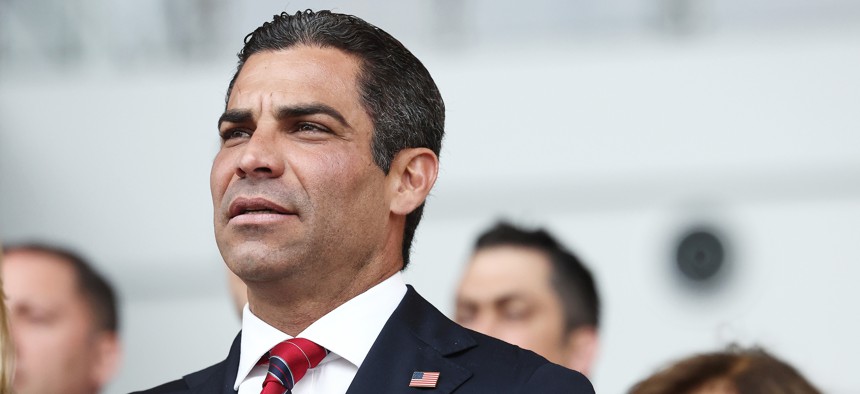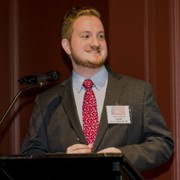Personality
Francis Suarez banking on 'Miami Model' as ticket to White House
The Republican mayor of Miami is the third prominent Floridian to declare his candidacy for president in 2024. Politics observers say, good luck with that.

Republican presidential candidate and Miami Mayor Francis Suarez recites the Pledge of Allegiance before delivering remarks at the Ronald Reagan Presidential Library, June 15, 2023 in Simi Valley, California. Suarez joins former President Donald Trump and Florida Gov. Ron DeSantis as the third announced GOP candidate from Florida and is the only Hispanic candidate in the 2024 presidential election. Photo by Mario Tama/Getty Images
Miami Mayor Francis Suarez launched his candidacy for president almost 3,000 miles away from the city he built his political career.
Inside the Ronald Reagan Library in California, the Republican Suarez touted the city’s growth and financial success, pledging to bring it to the rest of the country. “Miami’s success and its record of success should not be an outlier in America. It should be commonplace across our country,” he said, while avoiding extended mention of his Cuban roots.
Previous coverage –
- Francis Suarez, un(block)chained
- On migrants, Miami's Francis Suarez, other mayors call on President Biden for help
- 'Everything is safe,' Francis Suarez says amid Trump arraignment in Miami
His out-of-state launch comes as he’s treading particularly turbulent waters in the Sunshine State:
— Suarez is the subject of an FBI investigation into consulting payments he received from a developer with business before the city.
— Several of his cryptocurrency projects have blown up in his face.
— Miami is facing one of the nation’s worst affordable housing crises.
This is all while joining a race where he is a distant third – and that’s just among GOP candidates from Florida.
Republican U.S. Rep. Carlos Giménez, former mayor of Miami-Dade County and a Donald Trump supporter, blasted Suarez on Fox News when news of the mayor’s filing to run broke. He said Suarez was trying to leverage his role as mayor of just the City of Miami into something politically significant.
Giménez pointed to the fact that he has only won political races that were largely uncontested with minimal voter turnout, and that Suarez voted against Ron DeSantis in the 2018 election, instead supporting Democratic candidate Andrew Gillum.
“He weaves a very good tale, but believe me, I know Francis Suarez very well. I will never, ever support him for President,” Giménez said.
The truth is that Francis Suarez is a fraud and has zero chance of winning the Republican nomination! pic.twitter.com/B4qWrceTQy
— Carlos A. Gimenez (@CarlosGimenezFL) June 14, 2023
Experts and critics of Suarez – who was ranked No. 4 on the inaugural City & State South Florida Power 100 list – are in agreement that there is little to no chance that he will take residence at 1600 Pennsylvania Ave. after this election cycle.
But some speculate that his candidacy is a way for him to (maybe) get on a Republican debate stage and build his profile for his next political step, whatever that might be. A request for comment is pending with Suarez’s office.
Suarez’s selling points and pitfalls
He had already telegraphed before his announcement that his main selling point would be the economic growth in Miami, namely his push to lure and encourage tech growth.
In what he labels the “Miami Model” on his campaign website, he touted Miami’s low 1.4% unemployment rate, and his tenure that included the creation of 8,000 jobs and the attraction of 81 companies to the area. The site claims he did this by turning Miami into a “leading hub for technology and innovation.
But his dance with tech has come with significant missteps.
His championing of MiamiCoin, which he bragged could allow Miami residents to eventually pay no local taxes, blew up when the cryptocurrency lost 99% of its value and trading was halted. His friendship and courting of former FTX billionaire Sam Bankman-Fried helped form local partnerships, but they went belly up when FTX did.
He also is touting a tough-on-crime, pro-police platform. On his website and in public appearances after his announcement, he discussed how Miami’s murder-rate during his tenure hit its lowest since the 1950’s, and reduced the city’s homelessness rate to its lowest since 2013. However, he had no administrative powers over law enforcement or any first responders as mayor.
Suarez’s successful political career in Miami is also far from self-made and largely untested. He ran on the coattails of his father, Xavier Suarez, the long-time mayor of Miami in the 1980s and ‘90s. Aside from a tough race in 2009 for the Miami City Commission, Suarez has either run unopposed or against largely unknown opponents, said Sean Foreman, a political science professor at Barry University in Miami.
Foreman opined that Suarez’s two terms as mayor were unimpressive, mostly for the economic missteps. He pointed to his failure to get a ballot initiative to enact a strong mayor system in the city – the job now is mostly ceremonial – and the long timeline it took to get a deal for a Miami soccer stadium for Inter Miami done.
As Axios explained, "The part-time Republican mayor doesn't oversee the city budget or any government departments and has no vote on legislation. Miami has a (commission-manager) form of government, where an appointed administrator executes commission legislation and runs day-to-day government operations."
“His reputation in Miami is good enough to help him do well here, but it's not enough to provide the juice to launch a national campaign,” Foreman told City & State.
Coupled with the mixed bag of his two terms is the recent emergence of allegations that Suarez took payments from a Miami developer for preferential treatment for permit approvals. The mayor has denied those accusations; the FBI is investigating.
Foreman said that isn’t what any presidential campaign wants to deal with at the start. “He risks bringing more attention to the alleged scandal by throwing his hat in the presidential ring,” he said. “It doesn't help when you're trying to run as the new fresh face, (the) clean anti-corruption candidate, and along with your announcement are stories of an FBI investigation.”
The allegations might not even be a factor in the race. Charles Zelden, political science professor at Nova Southeastern University, said that Trump’s rising poll numbers amid his own investigations could be a sign that many GOP faithful don’t care about allegations of impropriety.
“At this stage, a lot of Republican voters don't seem to be that concerned about these types of contentions. If they like the candidate, they like the candidate,” he said.
Does he have a chance?
Most polling has been before he declared his candidacy, and the ones that do have him show his support at below 1%. Even his home of Miami-Dade would likely throw in behind Donald Trump or Ron DeSantis, two Florida Republicans who have dominated there in recent elections.
He is also facing a lot of headwinds financially. While he has about $5 million left in his state political committee, Miami for Everyone, that is being transferred to a federal PC that has been renamed the SOS America PAC. The PAC’s website features a landing page ad that leans heavily into Suarez’s pro-law enforcement and Miami-success campaign message.
Its funding includes $1 million from conservative hedge fund CEO Ken Griffin, that total is dwarfed by the amount DeSantis raised in the first day of his campaign, not to mention the money the governor carried over from his gubernatorial run.
In fact, the Reagan Library’s YouTube livestream of his announcement only mustered about 3,000 views 12 hours after the announcement – not even 1% of DeSantis’ campaign announcement’s live listenership on a buggier platform.
Florida Republicans generally have not jumped at the opportunity to align themselves with Suarez. Republican state and national lawmakers have either thrown in behind Trump or DeSantis. Most party officials have been silent, at least publicly, about his candidacy.
Zelden said his decision to run likely is more about building his national profile to push for a cabinet position or other national role if a Republican wins in 2024, similar to how Pete Buttigieg leveraged his 2020 run into Secretary of Transportation.
To build a profile, Suarez will at least have to get on the debate stage, which Republican party rules have determined he needs at least 20,000 donors spread out among eight states, and crack two polls by at least 1%.
“The debate stage is a great opportunity for him to have a chance to show his stuff and build his brand. That is likely his campaign’s primary goal right now,” Zelden said.
But such a play comes with significant risk.
Foreman said a disastrous showing could have lasting repercussions for Suarez. “The risk of running a vanity presidential campaign is that then when you fail, some people see you as a loser. And then it's a little harder to rebound and justify why you're a good pick for the next position,” he said.
The increased notoriety from a presidential run will also come with increased scrutiny.
Thomas Kennedy, a progressive Miami activist and Democratic National Committee member, said not enough criticism was levied at Suarez by local media during his time as Miami’s mayor. He believes that will change with national media now watching.
“The media class were coddling this guy and treated him as some innovator and disrupter, when he was saying blatantly moronic things,” Kennedy said. “The national media won’t do that.”
Contact Tristan Wood at twood@cityandstatefl.com and follow him on Twitter: @TristanDWood.
NEXT STORY: This week’s biggest Winners & Losers
